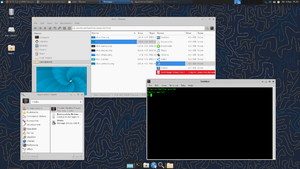This article or section has little to no citations.
This template is to be used on pages which may lack credible citations, as per our citations guidelines. You can assist by editing it. See Category:Needs Citations for other pages that require more citations.
This article or section may require a cleanup. The specific problem is: Citations lack information required in the guidelines.
This template means a page might not meet the wiki's guidelines. You can assist by editing it. You can see Category:Pages Needing Cleanup for other pages that still need to be reviewed.
 XFCE logo | |
| Release Status | Maintained |
|---|---|
| Last Release | Xfce 4.20, 2024-12-15 |
| Language(s) | C |
| Developer(s) | Free software community |
| Website | xfce.org |

Xfce is a lightweight desktop environment aiming to be fast for weaker hardware while still remaining user friendly. The original author of Xfce was Olivier Fourdan and the first release of Xfce came out in 1997. [CITATION]
Features
Xfce has all the basic features of a desktop environment despite its goal of minimalism. The most basic components of Xfce are:
- Window Manager (Xfwm) - Manages the placement of windows on the screen, provides window decorations and manages workspaces or virtual desktops.
- Desktop Manager - Sets the background image and provides a root window menu, desktop icons or minimized icons and a windows list.
- Panel - Switch between opened windows, launch applications, switch workspaces and menu plugins to browse applications or directories.
- Session Manager - Controls the login and power management of the desktop and allows you to store multiple login sessions.
- Application Finder - Shows the applications installed on your system in categories, so you can quickly find and launch them.
- File Manager (Thunar) - Provides the basic file-management features and unique utilities like the bulk renamer.
- Settings Manager - Tools to control the various settings of the desktop; like keyboard shortcuts, appearance, display settings, etc.
Xfce has many other optional applications, such as a terminal emulator, text editor, sound mixer, application finder, image viewer, iCal based calendar and a CD and DVD burning application.[1]
